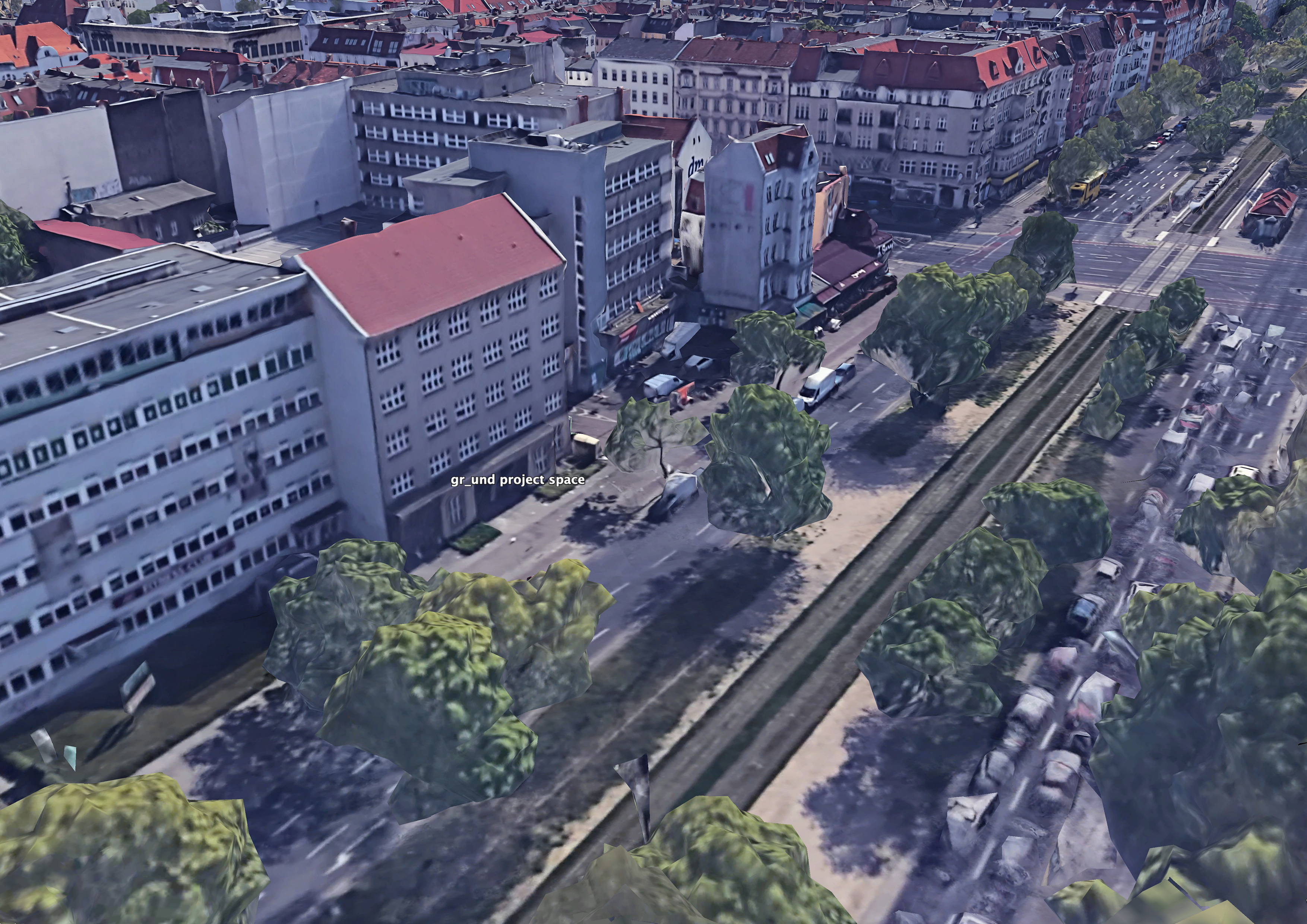NINA BLUME
Nina Blume (she/her) is an Amsterdam-based spatial researcher, designer, and curator. Her practice and discourse center on spatially rooted traces of historical and contemporary violence within infrastructural spaces and sites of resource extraction. Through sonic and visual investigations, her works target patterns of environmental injustice and the continuation of land grabbing under green narratives–including fieldwork and program organizing. She is a current fellow of
“Organismo: Art in Applied Critical Ecologies” in the case study of Non-Archives at TBA21.
Nina is a graduate from MA Studio for Immediate Spaces at the Sandberg Instituut [2022-2024]. Prior education include a bachelor's degree in Visual Communication with honors [University of Applied Science, Potsdam, 2016–21], an exchange semester at Zurich University of Arts [BA Trends & Identity, 2018] and additional non-institutional curricula.
She
initiates, hosts, and curates platforms, group shows, lecture programs, and workshops as part of ORGA' [2020-2023] and previously Non-Depleted [2020-2023]. Between 2019–2022 she was an artist member of the project space Gr_und and was working as an editorial assistant at Making Futures, a practice-based research project of the architecture studio Raumlabor [2020-2022].
Curatorial Practice
Education
ORGA’
Rietveld Pavillion, Amsterdam, The Netherlands.
25–26.04.2024
SOAKED POLITICS
Sandberg Instituut, Amsterdam, The Netherlands.
24.04.2023
WATERY RELATIONS
Sandberg Instituut, Amsterdam, The Netherlands.
12.05.2023
POSITIONED REALITIES
Haus der Statistik, Berlin, Germany.
04.03–27.03.2022
(NON)DEPLETED
Gr_und, Berlin, Germany
16.04—30.05.2021
(NON)DEPLETED
Gr_und, Berlin Design Week 2021
28.05–30.05.21
(NON)DEPLETED
Virtual showroom, Dutch Design Week 2020
17—25.10.2020
PARASITIC READING ROOM + (NON)DEPLETED
virtual reading session with Rosario Talevi
24.10.2020
Rietveld Pavillion, Amsterdam, The Netherlands.
25–26.04.2024
SOAKED POLITICS
Sandberg Instituut, Amsterdam, The Netherlands.
24.04.2023
WATERY RELATIONS
Sandberg Instituut, Amsterdam, The Netherlands.
12.05.2023
POSITIONED REALITIES
Haus der Statistik, Berlin, Germany.
04.03–27.03.2022
(NON)DEPLETED
Gr_und, Berlin, Germany
16.04—30.05.2021
(NON)DEPLETED
Gr_und, Berlin Design Week 2021
28.05–30.05.21
(NON)DEPLETED
Virtual showroom, Dutch Design Week 2020
17—25.10.2020
PARASITIC READING ROOM + (NON)DEPLETED
virtual reading session with Rosario Talevi
24.10.2020
MA STUDIO FOR IMMEDIATE SPACES
Sandberg Instituut
2022–2024
BA VISUAL COMMUNICATION
FH Postdam, Germany
2015—2021
TRENDS & IDENTITY
ZHdK, Zurich,
2018
ORGANISMO: ART IN CRITICAL ECOLOGIES
TBA21/Museo Nacional Thyssen-Bornemisza, Madird, Spain
CLEAN WATERS Matka in Action, Sulina, Romania
12—25.09.2024
VENICE MAPPING: MIS-READING INFRASTRUCTURES Ca’Buccari, Venice, Italy
17–21.09.2023
ACADEMY OF MARGINS: WATERSHED WHISPERS
Robida, Topló, Italy
07–13.08.2023
Sandberg Instituut
2022–2024
BA VISUAL COMMUNICATION
FH Postdam, Germany
2015—2021
TRENDS & IDENTITY
ZHdK, Zurich,
2018
Fellowships
ORGANISMO: ART IN CRITICAL ECOLOGIES
TBA21/Museo Nacional Thyssen-Bornemisza, Madird, Spain
Residencies
CLEAN WATERS Matka in Action, Sulina, Romania
12—25.09.2024
VENICE MAPPING: MIS-READING INFRASTRUCTURES Ca’Buccari, Venice, Italy
17–21.09.2023
ACADEMY OF MARGINS: WATERSHED WHISPERS
Robida, Topló, Italy
07–13.08.2023
UNDERNEATH THE BRICK SKIN
2024
Rooted in Germany's green energy transition plans, a renewed interest in its former colony for the production of green hydrogen has brought Namibia back to German attention. At the intersection of history, activism, and the ongoing struggle for justice, the research intends to ground broader questions on the continuation of land grabs under green narratives of hydrogen production.
The investigation centers on the case study of Hyphen, a green hydrogen infrastructure project co-owned by German renewable energy company ENERTRAG. Taking shape on the very same landscape transformed by German colonial violence, theft of Indigenous land, resource exploitation, and the genocide of Nama and OvaHerro people on which Bremen-born colonialist Adolf Lüderitz imposed his name and legacy. Sensitive acknowledgment of these spatially anchored traces of colonial history emphasizes that energy transition cannot be achieved in isolation from global inequalities, colonial histories of oppression, and capitalist lobbying.



image credits: Tom Philip Janssen
WHEN TULIP MANIA DIES DOWN, ALL THAT REMAINS ARE PRETTY FLOWERS 2024
‘When tulip mania dies down, all that remains are pretty flowers’ is a series of artifacts that trace the narratives around the „RoyalFlora Holland“ and explore the valuation of flowers. In an auction simulation, the screens show product images while De Klok dictates the rhythm at a fast pace.
The video is a poetic anthropological study: an act of witnessing and recording a specific industry that operates according to its own registers and scales. It touches on the social and historical, local and global dynamics of the operations of Royal FloraHolland and emphasizes the human side of the trade system, the personal identification with the system, the estrangement of the processes through globalization, the anonymization of the cooperating entities, and the speculative aspect of trading, in all its absurdity.
Part of Bulb Bubble Burst
In collaboration with Djina Bruine de Bruin, Gabija Nedziskaite, Enno Poetschke and Robin Vanderbusche

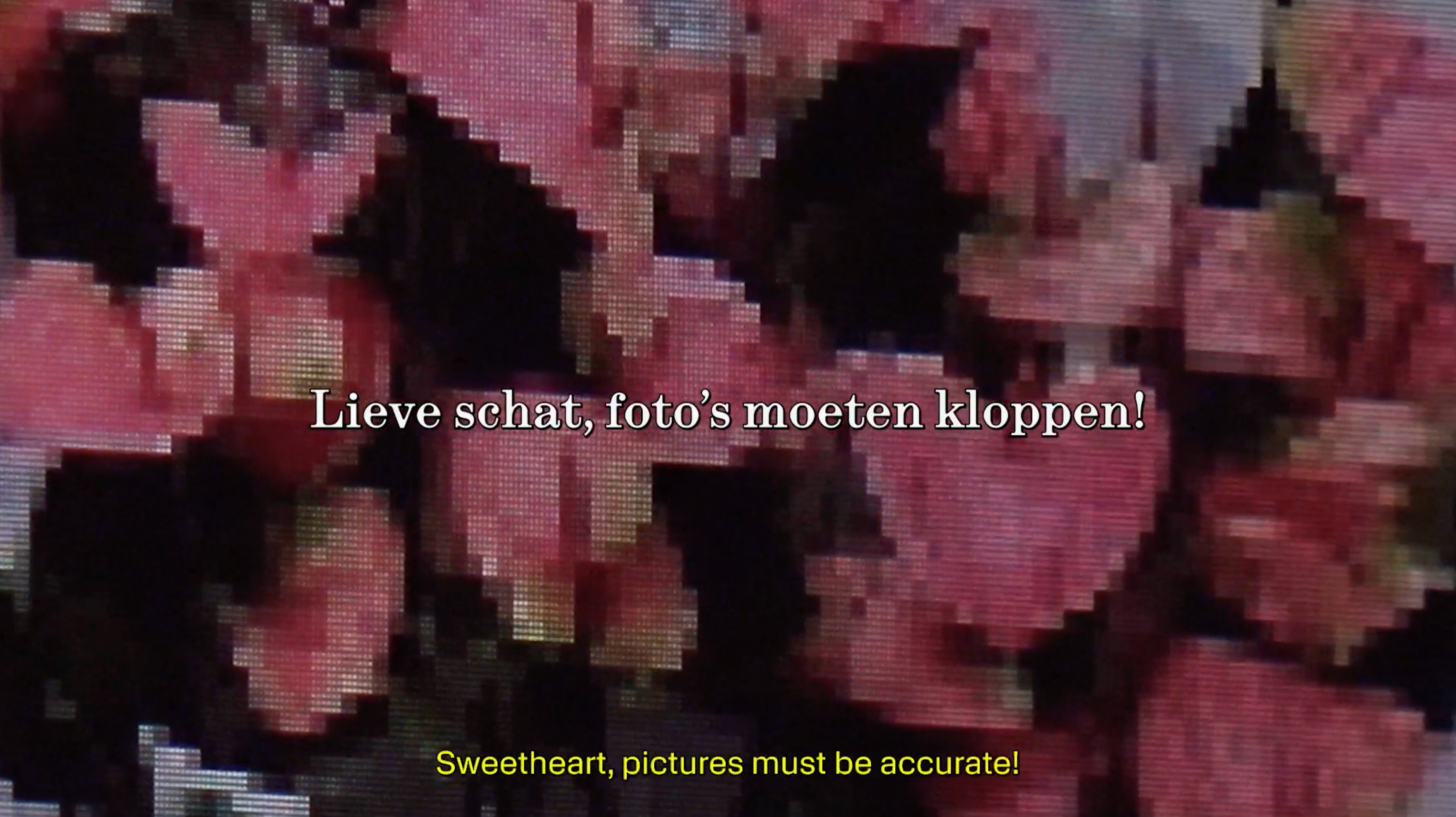

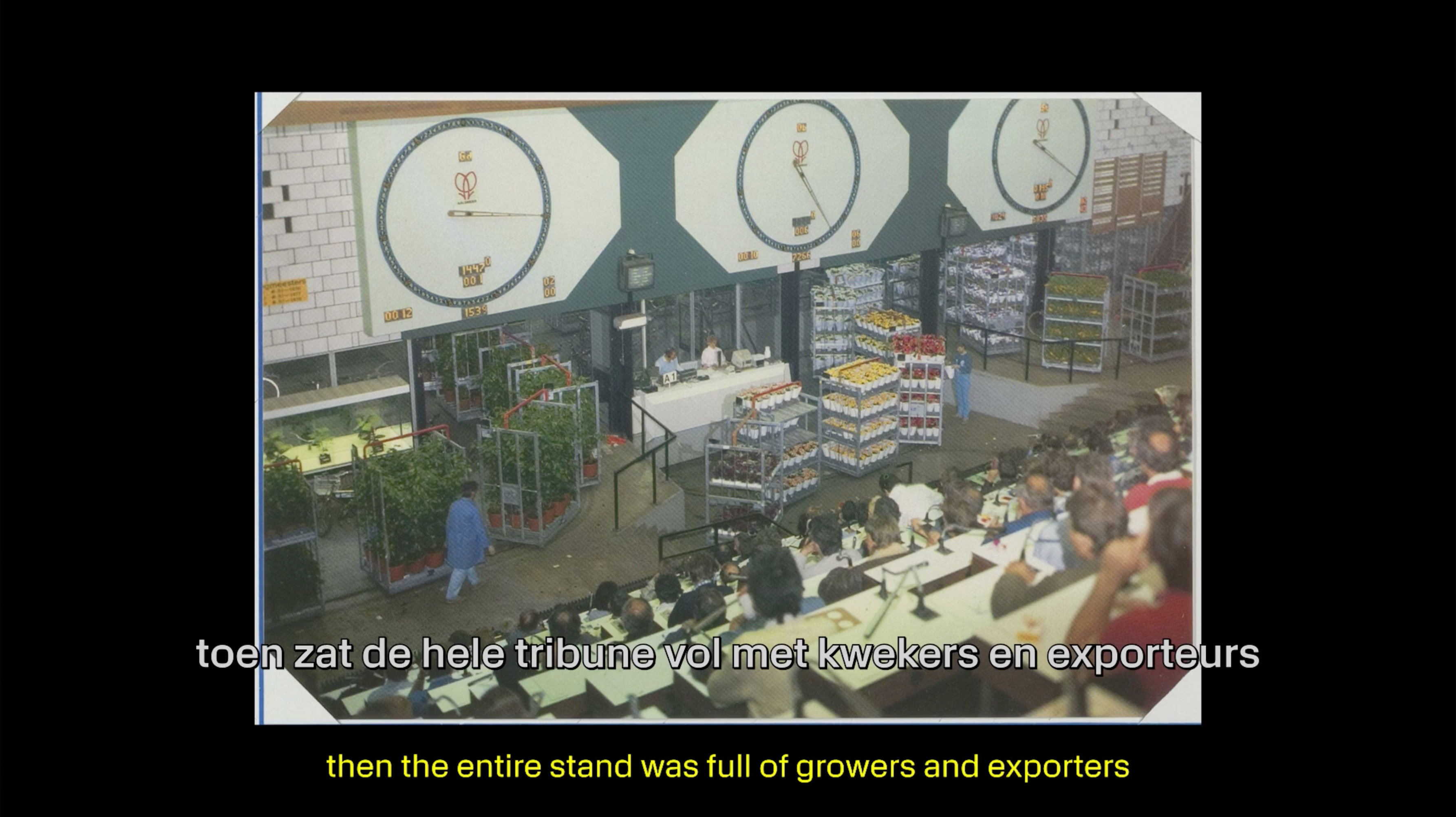
image credits: Tom Philip Janssen
TAPPING WATER – PROGRAM
2023
Tapping Water holds space and invites dissident voices committed to critiquing resource commodification and mercantilism. Taking place at Sandberg Instituut, the two-day extracurricular program focused on the multi-faceted issue of freshwater scarcity under the framings of “Soaked Politics” and “Flows of Resistance” Uncovering some of the complexities of the freshwater crisis through situated case studies enables more sensitive and relational ways of connecting local and larger struggles.
The program included workshops, listing sessions, and lectures that touched upon freshwater sovereignty, colonial infrastructures, and geopolitics around hydropower dams, where we invited the national leader of the feminist organization Juntas y a la Izquierda Celeste Fierro together with socio-environmental activist and spokesperson Jessica Gentile to report on the latest demonstrations at Lake Escondido as a template for direct action on the water crisis and people‘s resistance; sound artist Oscar van Leest and Jonathan Castro, who performed collaborative sonic improvisations around field-recordings, Emmie Massias with her project around the Mekong Delta and Moroccan spatial researcher Sara Frikech.
Organized with Sebastian Guzman Olmos.
Supported by Sandberg Instituut’s Student Council. [Amsterdam, The Netherlands]
Contriutors: Celeste Fierro, Emmie Massias, Jessica Gentile, Jonathan Castro, Oscar van Leest and Sara Frikech

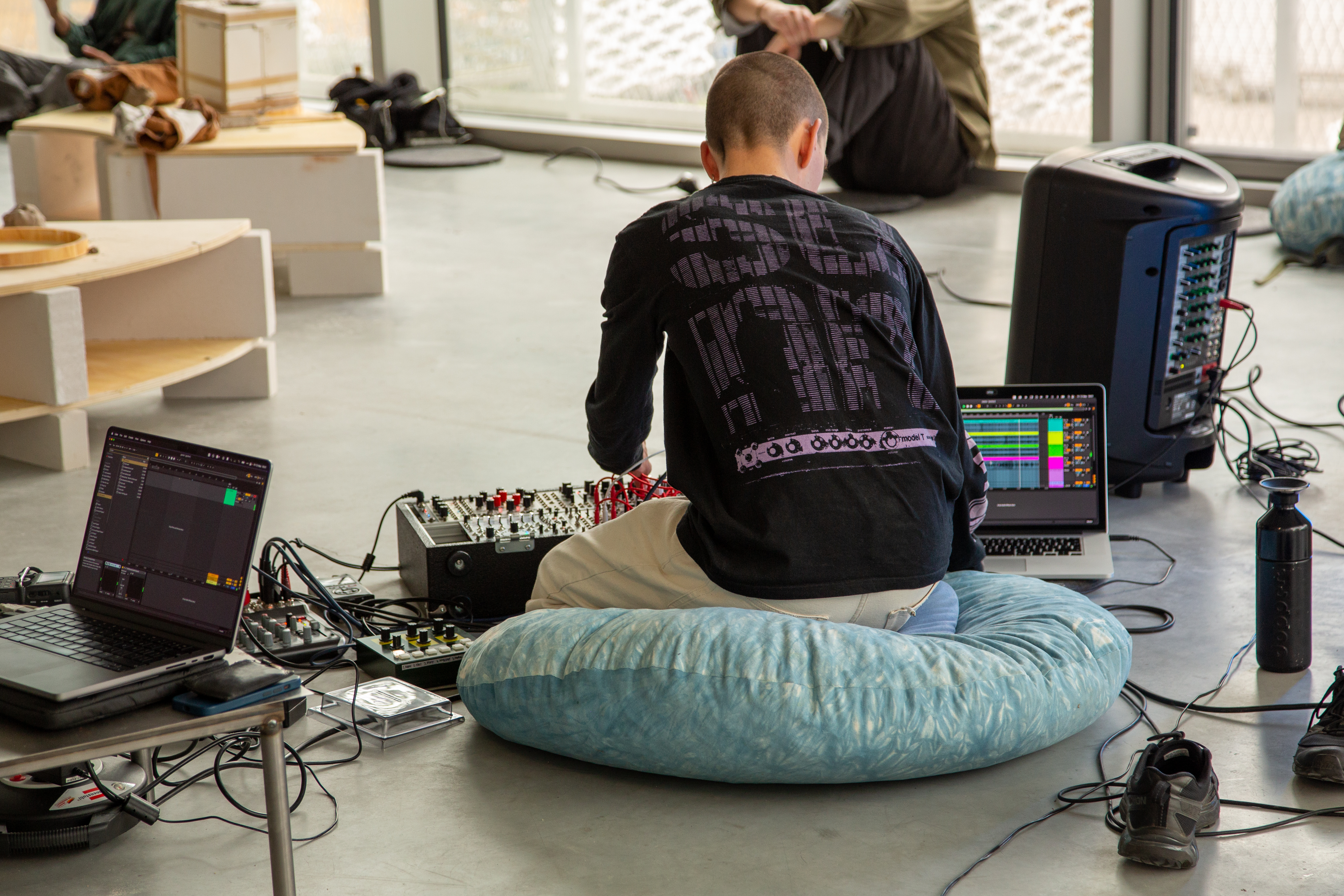
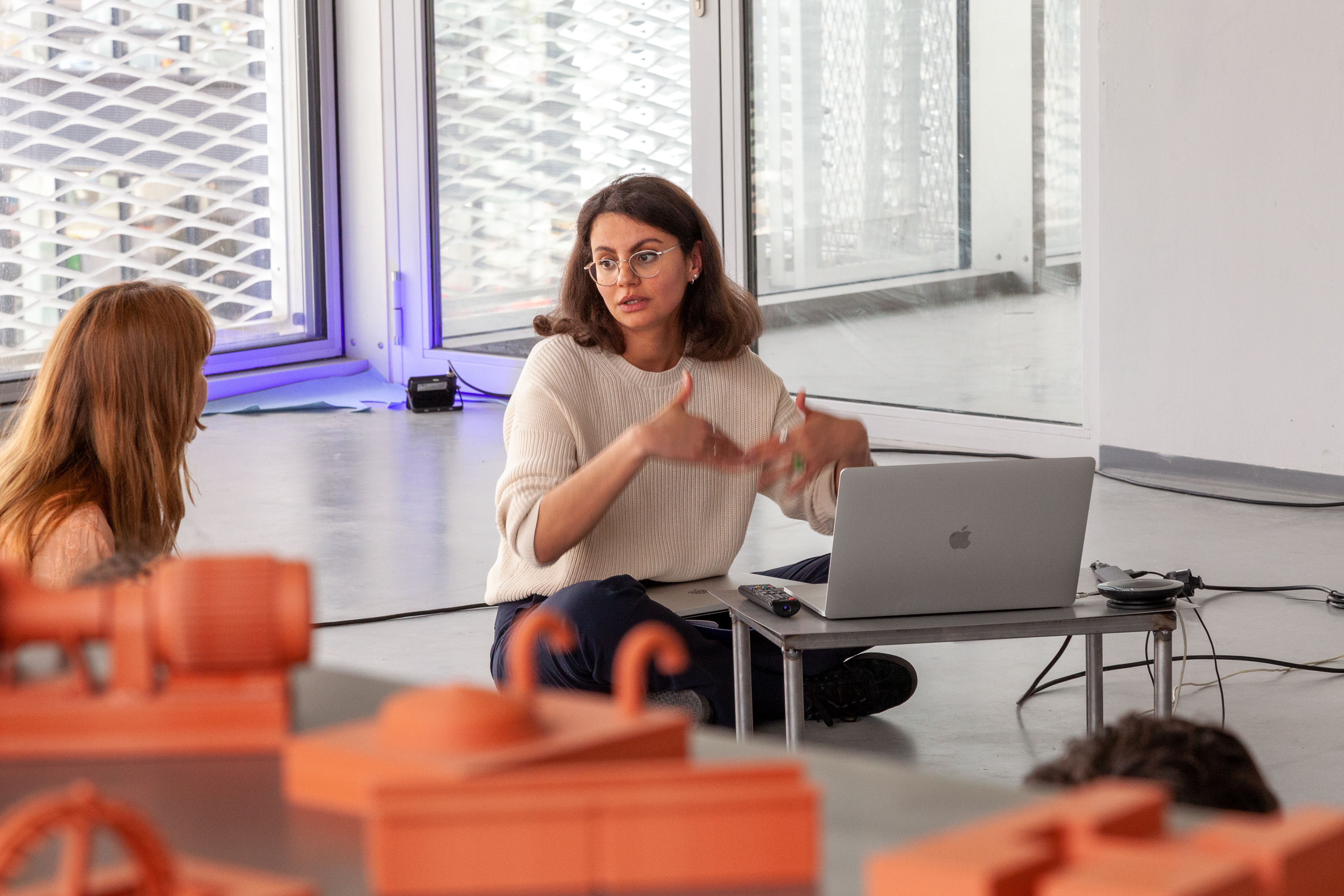
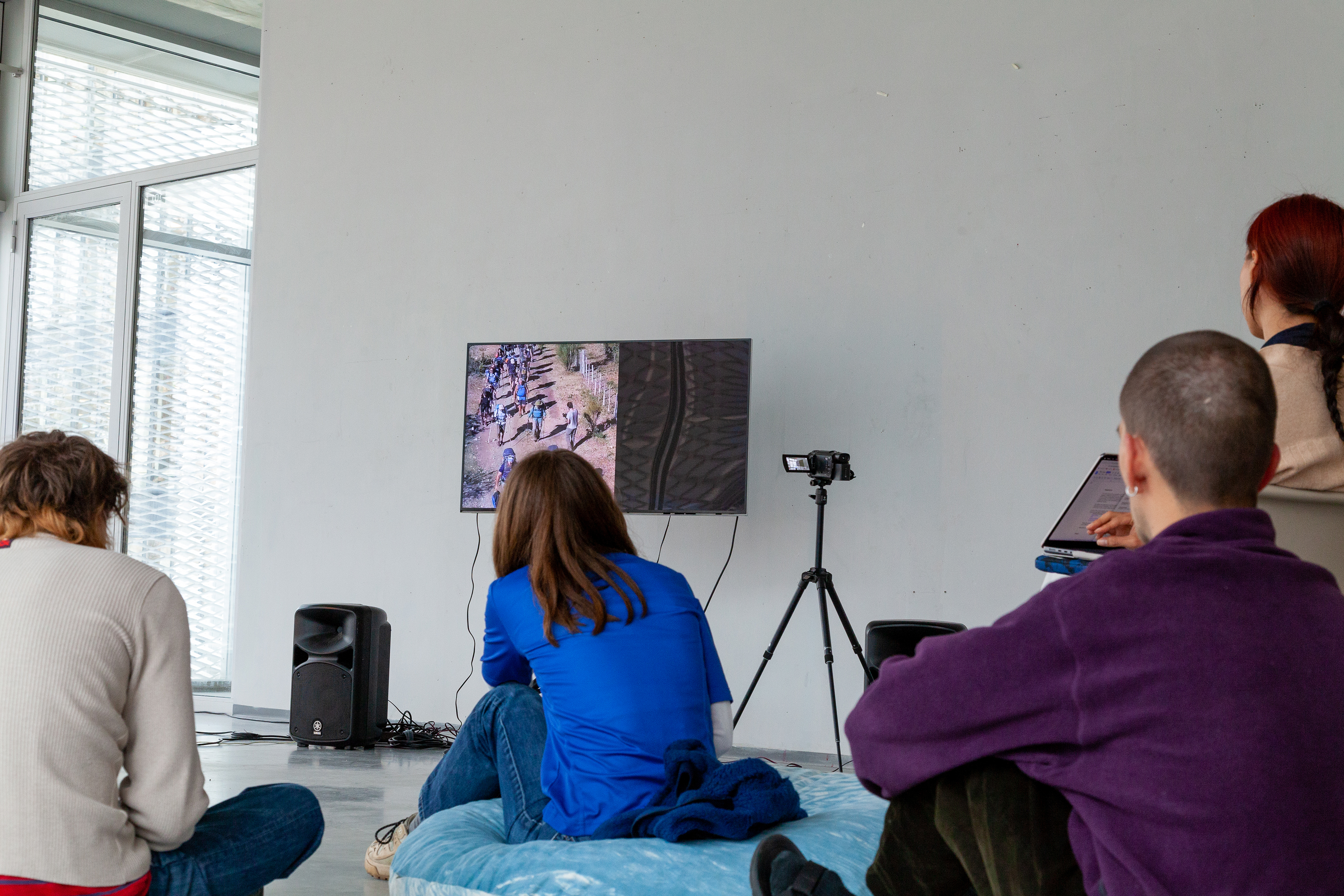
image credits: Ilya Lindhout
TAPPING WATER – RESEARCH
2023
How does scarcity not only reflects physical availability, instead relate to the ideologies, practices, and continuities of framing, controlling, and profiting from flows of water, money, and power? And how do infrastructures affect our watery relations intimately muddled in our bodies, environments and geo-political systems?
TAPPING WATER is an ongoing investigation enganing in various relations with tap water, which circulates through our bodies, environments, and political systems. Entering the complexities of the freshwater crisis from s haring situated challenges of local water resources that feed the tap water systems, methologies included field research and sonic investigations, workshops, writings and a tap water bar.

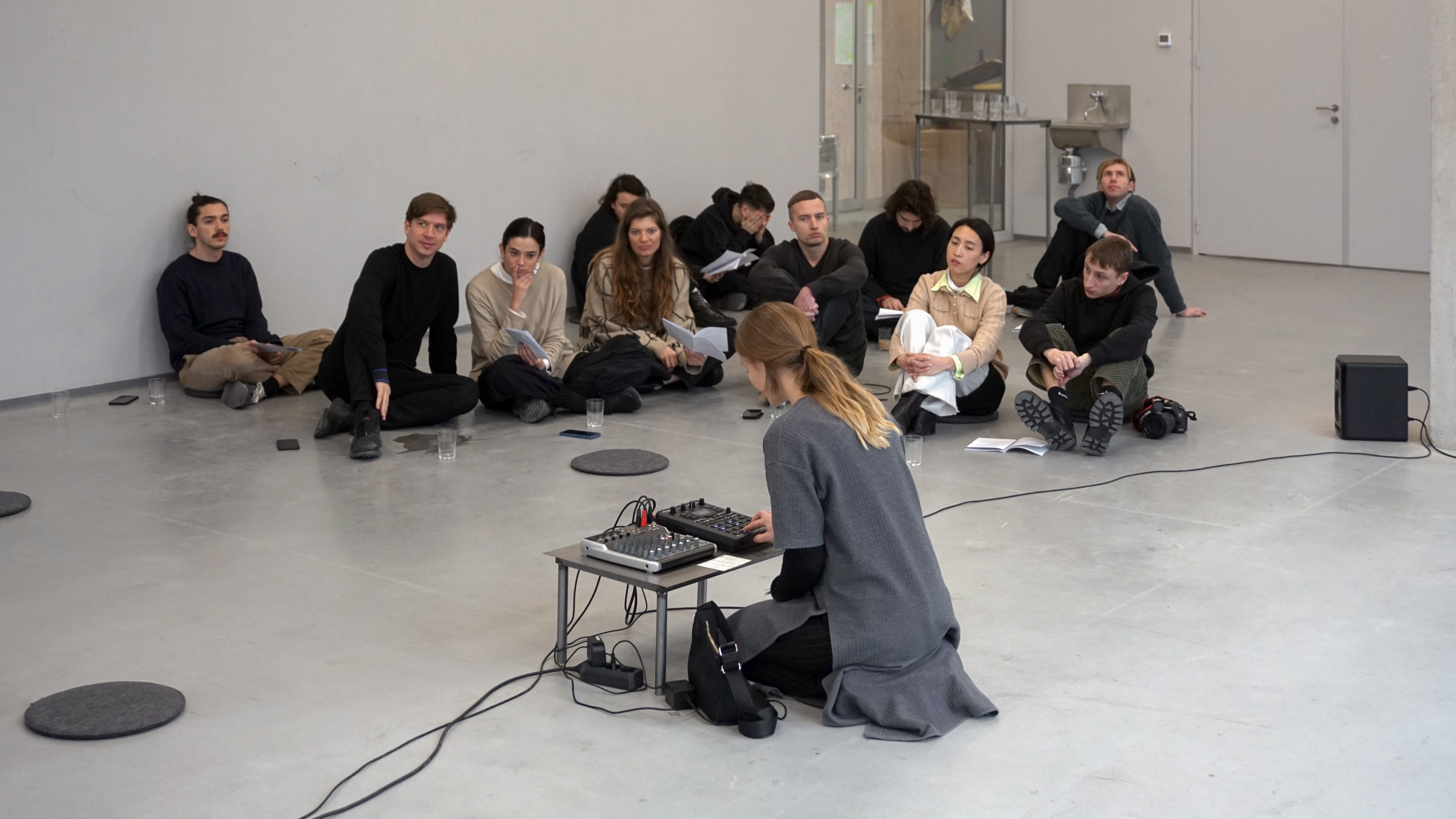
WATERWORKS
2024
Buried under the paving flows a parallel stream of the Danube, as a connection between the bliss of running water in homes, local folklore, and international sanitary diplomacy. Located at the mouth of the only navigable branch, where the Danube whispers its secrets into the Black Sea. Sulina’s sandbanks were exacerbated by a transnational network of entrepreneurs who capitalized on the settlement’s location. Bringing prosperity and disease to Sulina in equal measure.
WATERWORKS is a field recording composition that immerses listeners in the sonic retellings of the waterworks in Sulina. By combining soundscape and 3D-scanned footage of the infrastructure space with recounted stories stored within the walls of Mr. Comârzan’s museum, the audiovisual study reflects on undercurrents of narratives surrounding the town’s water system.
The project has was developed during the Clean Waters Residency in Sulina alongside 11 artists from countries bordering the Danube: Nadja Kracunvic (Serbia / Germany), Veronika Varga (Hungary), Daria Anghel (Romania), Vitaly Yankovy (Ukraine), Manuela Pauk ( Croatia), Nina Blume (Germany), Marco Verhoogt (Romania), Lukatoyboy (Serbia / Germany), Agnes Bakucz Canário (Austria), Mihaela Vasiliu and Mara Oglakci (Romania).
Curators: Mihaela Cîrjan and Daniela Custrin.

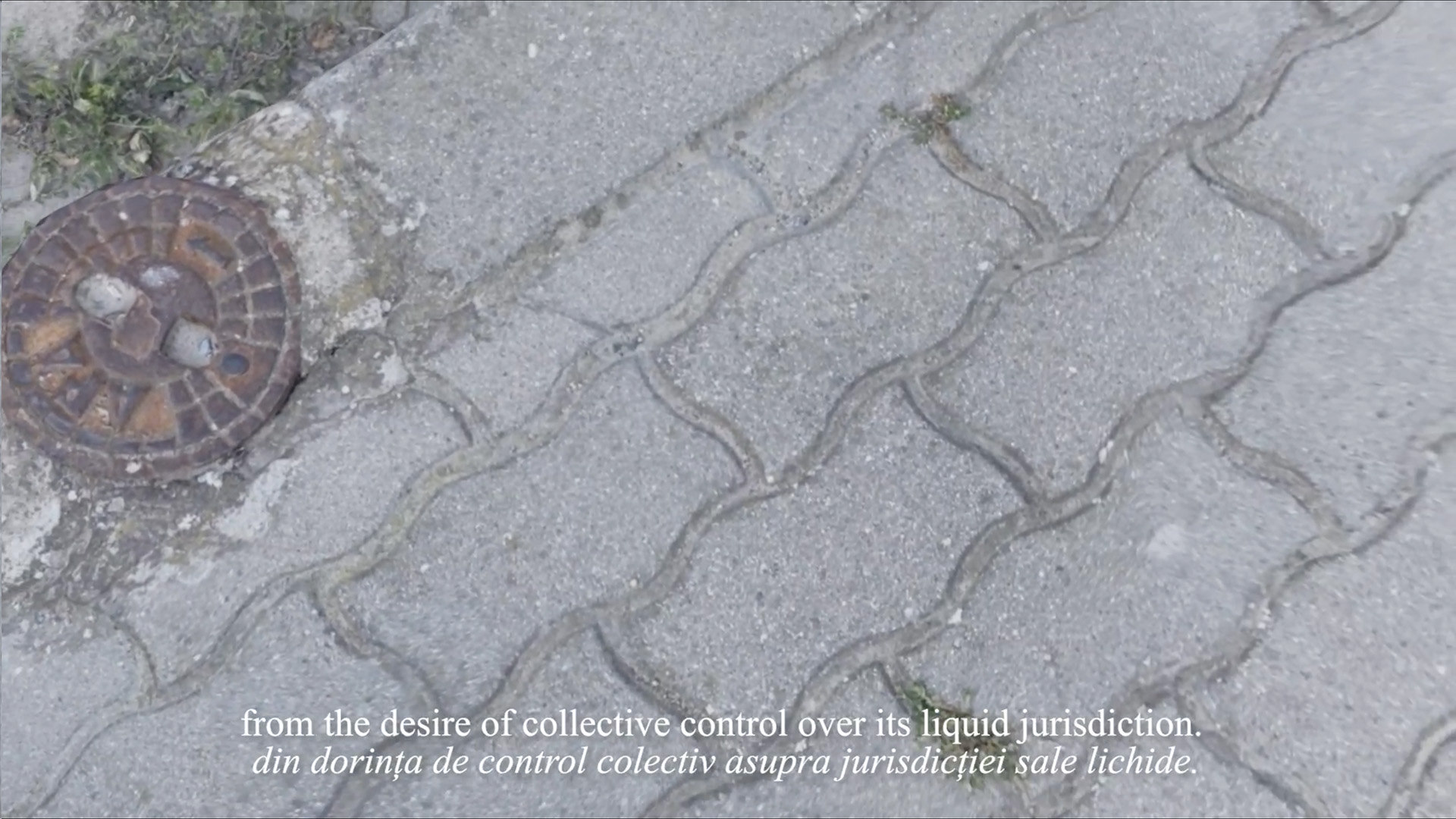

POSITIONED REALITIES
2022
Plural conditions for change are knocking on our doors. How we position ourselves is instrumental to fostering other ways of being and sensing—away from a western gaze that proclaims universality. While we actively embrace difference and the communal. Strategies for thinking about exits and alternatives beyond the modern/colonial order and its endless shortcomings.
Positioned Realities is a transnational assemblage of visual and spatial projects. Who operate within or between capital, class, race, gender and land—navigating across places, bodies and environmental dimensions. Reflecting, intervening, and delinking from dominant ideologies, frameworks, and continuities of Western historical reality.
Curated with Oliverio Segura and Sebastian Guzman Olmos.
Visual Identity: Can Yang. Location: Haus der Statistik
BERLIN, GERMANY
Contributors: Carlos Sfeir, Jeanine Van Berkel, Jonathan Catro, Leo Maher, Melissa Berney, Michele Boulogne, Negiste Yesside Johnson, Noa Jansma, The Privilege of Dreaming by Luïza Luz

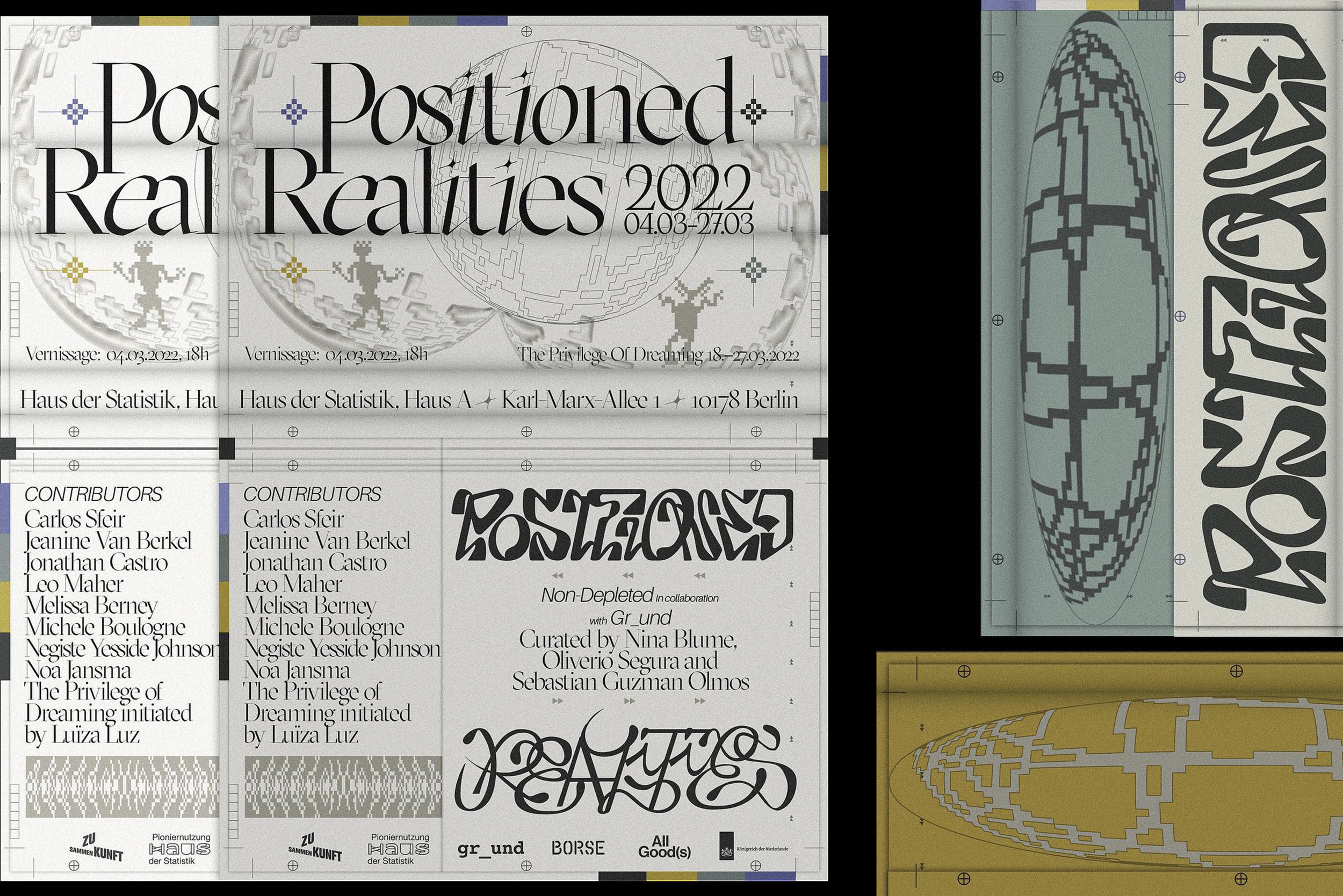

(NON)DEPLETED
2021
Through a choir of critical but upbeat voices, the exhibition explores unconventional roads to material and systems. That enables different tactics, methodologies and perspectives—translated into research-based practice.
As the contributions transverse different material narratives, they explore modes of visually posing questions and opening up space for a multitude of perspectives—reaching a moment of reflection than a conclusion. An in-between state of transition and not yet knowing—where a statement does not has to be an answer. Letting go of the innovation-driven society’s expectations to claim solutions.
Curated with Oliverio Segura and Sebastian Guzman Olmos.
Guest curator: Johanna Honkomp. Visual Identity: Delphine Lejeune
BERLIN, GERMANY
Contributors: Barry Llewellyn, Blast Studio, Claudia Bumb, Crafting plastics! studio, Davide Piscitelli, Delphine Lejeune, Kajsa Melchior, Louise Bègue-Teissier, Noa Jasma, Paulo Arraiano, Rollo Bryant, Romain Albers, Sarah Roseman, Vincent Snijders

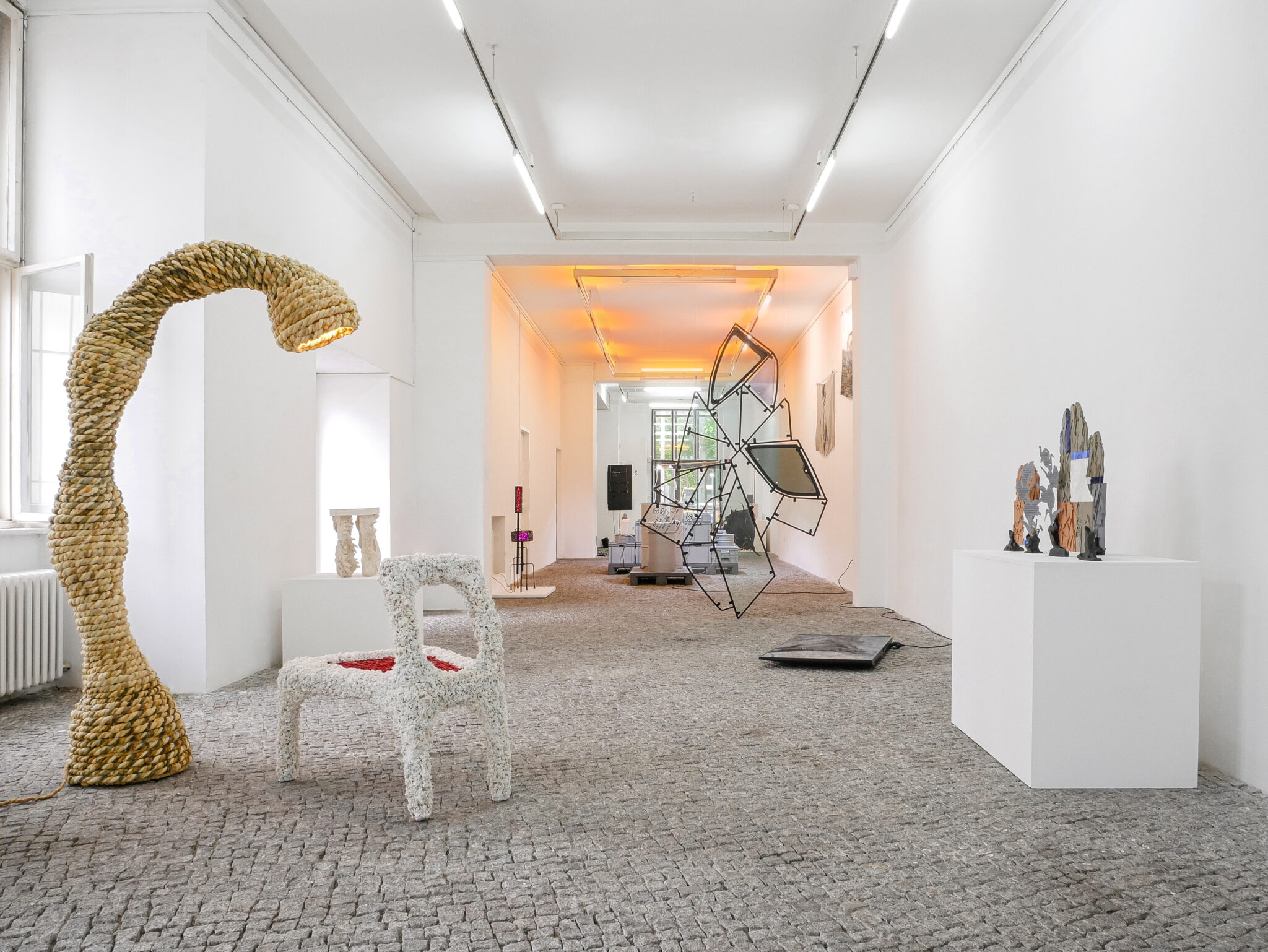
CURATING GAPS
2021
In a time of ecological collapse and social division, the concept of gaps sounds like something that will drive us further apart. But in these challenging times, it is crucial to promote the value of sharing ideas in the design, art, and curatorial field and to help imagine a shared future by demonstrating that progress is achieved by pooling knowledge. For generations, creative minds have been tackling challenges like climate breakdown and resource depletion in projects with a political, social, and environmental focus. They actively address contemporary challenges using research methods and formulate the knowledge gained in different forms of visual information, various applications and methods.

(NON)DEPLETED – DDW
2020
(Non)Depleted is a group exhibition gathering several local and international designers/artists. Through the presented projects, we are exploring the meanings of depletion—from resource extraction to critical thinking about social, political and ecological exhaustion. Presenting a broad spectrum of directions of how we might creatively envision an alternative to the ongoing system from an ideological, material, aesthetical and renewable perspective.
These proposals are seeking to expand how we can re-envision our methods, infrastructures and the meanings of materials. Not assuming to have answers but critically questioning and inviting the audience to think with us what we want forward to mean–by taking in mind the distance act of spectating.
Curated with Oliverio Segura and Sebastian Guzman Olmos.
Visual Identity: Mathias Malm
EINDHOVEN, NETHERLANDS
Contributors: Anna Solal, Barry Llewellyn, Blast Studio, Crafting plastics! studio, Davide Piscitelli, Elissa Brunato, Kajsa Melchior, Louise Bègue-Teissier, Mathias Malm, Noa Jasma, Orson Oxo Van Beek, Paulo Arraiano, Quinten Mestdagh, Rollo Bryant, Romain Albers, Rosario Talevi, Sarah Roseman, Studio KBB, Vincent Snijders

MAKING FUTURES
2020–2022
Making Futures Bauhaus+ is a practice-based research project in collaboration between raumlabor and the Berlin University of the Arts (UdK). Since 2018, Making Futures has investigated, questioned and explored (future) spatial practice. In schools, workshops, and other educational formats, the project has explored modes of city-making based around diverse forms of knowledge exchange and productive cooperation. A non-disciplinary learning environment, which proposes, designs, builds, negotiates, maintains, performs and celebrates an educational and convivial space.
Making Futures Team: Markus Bader, Juan Chacón, George Kafka, Anna Kokalanova, Christof Mayer, Nina Blume, Tatjana Schneider, Rosario Talevi

SOME MAGAZINE #10: Fire
2020
The Some Magazine was first published in 2010 under the direction of Prof. Sven Völker. The non-profit magazine has a foothold in independent publishing and was available in bookshops at MoMA in New York, Colette in Paris and Doyoureadme? in Berlin. The aim of the independent publication is to report on the interface between design and art.
The last issue was published in 2015; after this far too long break, our editorial team brought the magazine back to the bookshelves. Where it is now available in Germany, Switzerland, The Netherland and Portugal.
Issue #10 revisited the unloved element, “Fire”. While all our sympathies fly unchecked to the three other primordial elements, i.e. earth, water and air, fire looks into an uncertain future. Associated with catastrophes, over-romanticism or pre-industrialisation. For this issue, we gathered designers and artists to unpack the wide-ranging narratives of fire collectively in the categories: Symbol, Power, Transform and Intimacy.
Editorial Team: Alma Halfpaap, Ariane Kaiser, Lea Flemming, Josephine Knoll, Kathrin Wedler, Nina BlumeContributors: Christian Jaccard, Corrina Goutos, Erik Campanini, GeoVanna Gonzalez, Kimiya Justus, Moshtari Hilal, Nadine Kolodziey, Sebastian Guzman Olmos, studio ilio, Studio Olafur Eliasson
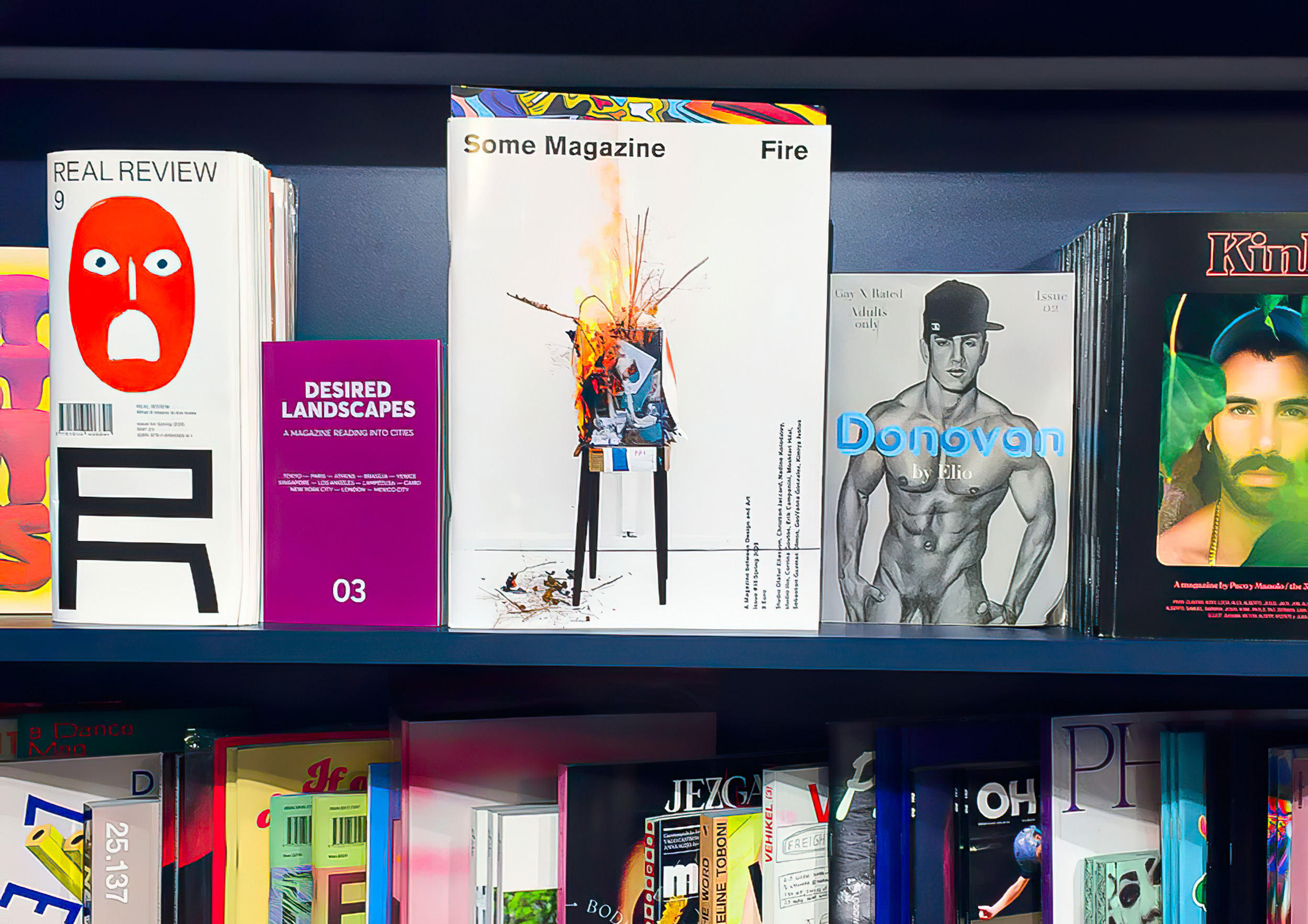
GR_UND
2018–2022
Gr_und is a nonprofit artist run space situated in Wedding, Berlin. With its 170m² it is an active space for the materialisation of curated concepts and artistic experimentation. Using multi-displinary methods of visual art, performance, sound and linguistics.
Since 2019 I joined the team, working on the various task to maintain, organise and celebrate the exhibtions taking place at Gr_und. The work includes, among other things, meetings with the artists, physiscal materialisation of the concepts, working behind the bar during openings, looking for funding oppertunities and designing artist publications.
Gr_und Team: Anna Frick, Cédric Mantel, Damien Sayer, James Verhille, Nina Blume
COUNTER CYCLING
2018
COUNTER CYCLING is a project, which explores the effects of nitrogen in a poetic an investigative way. While CO2 has won its place in public attention and awareness, the issue of nitrogen is still very much in the background. The project attempts to change that by initiating consciousness through interactive visualisations and artistic experiments. In collaboration with Myriel Milicevic, we exhibited an interactive installation consisting of various objects to explore the thematic of nitrogen in a playful way. The different tools of “Counter Cycleing” measure the urban nitrogen and draw Counter-Cycles for soil, water and air. This interactive and artistic transfer of knowledge is intended to create new approaches to environmental policy issues.
The project was shown within the group exhibition’s “Dé-Jardiner”, which examined the urban garden’s anthropomorphisation as a space designed by humankind for its own convenience.

